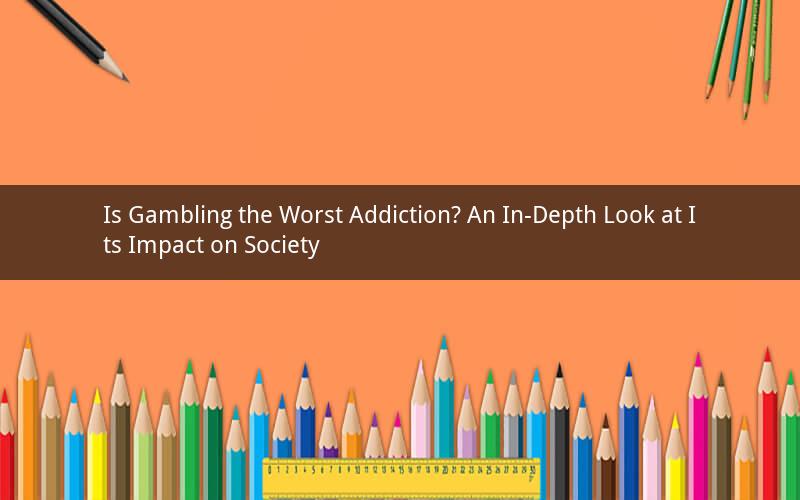
Introduction:
Gambling has been a prevalent form of entertainment and a source of revenue for centuries. However, the rise in accessibility and the ease of online gambling have led to an increase in problem gambling. This essay explores the question of whether gambling is the worst addiction, examining its consequences on individuals, families, and society as a whole.
I. The Definition of Addiction
An addiction is characterized by compulsive engagement in rewarding stimuli despite adverse consequences. It involves a loss of control over behavior, significant impairment in personal, social, or occupational functioning, and continued engagement in the addictive behavior despite negative consequences.
II. The Prevalence of Gambling Addiction
Gambling addiction, also known as problem gambling or pathological gambling, is a growing concern worldwide. According to the National Council on Problem Gambling, it affects approximately 2-3% of the adult population in the United States. This figure is even higher in some countries where gambling is more prevalent.
III. The Impact on Individuals
A. Physical Health
Gambling addiction can lead to a range of physical health issues, including heart disease, high blood pressure, and sleep disorders. The stress and anxiety associated with problem gambling can also contribute to mental health problems such as depression and anxiety.
B. Mental Health
Problem gambling can cause significant mental health issues, including addiction, depression, anxiety, and substance abuse. The constant need for more money to sustain gambling habits can lead to feelings of hopelessness and despair.
C. Social Relationships
Gambling addiction can strain social relationships, leading to isolation, broken families, and friendships. Individuals with gambling problems may lie, steal, or manipulate others to obtain money for gambling.
IV. The Impact on Families
A. Financial Strain
Problem gambling can cause significant financial strain on families, leading to debt, bankruptcy, and even homelessness. The emotional and psychological toll on family members can also lead to strained relationships and increased stress.
B. Emotional and Psychological Impact
Family members of individuals with gambling problems often experience emotional and psychological distress, including guilt, anger, and frustration. The stress of supporting a loved one with a gambling addiction can lead to mental health issues for family members as well.
V. The Impact on Society
A. Economic Costs
The economic costs of gambling addiction are substantial, including lost productivity, increased healthcare costs, and increased criminal activity. The cost of treating gambling addiction and the costs associated with the consequences of problem gambling, such as bankruptcy, can be significant.
B. Social Costs
Gambling addiction can lead to social issues, including crime, increased homelessness, and strained community resources. The social costs of gambling addiction can have a ripple effect on communities, impacting public safety and social stability.
VI. The Comparison with Other Addictions
While gambling addiction is a significant concern, it is essential to consider the impact of other addictions, such as drug and alcohol addiction. While the consequences of these addictions may be more immediate and severe, gambling addiction can have long-lasting and far-reaching effects on individuals, families, and society.
VII. Conclusion
Is gambling the worst addiction? The answer to this question is not straightforward. While gambling addiction can have devastating consequences on individuals, families, and society, it is essential to recognize that other addictions, such as drug and alcohol addiction, can also have severe consequences. The key to addressing addiction is to provide support, treatment, and resources to individuals and families affected by addiction, regardless of the specific substance or behavior involved.
Questions and Answers:
1. What are the common signs of gambling addiction?
Answer: Common signs of gambling addiction include an inability to control gambling behavior, lying about gambling activities, neglecting personal responsibilities, and experiencing negative consequences as a result of gambling.
2. How can gambling addiction be treated?
Answer: Treatment for gambling addiction can include therapy, support groups, and medication. Cognitive-behavioral therapy (CBT) is often used to help individuals develop healthier coping mechanisms and address the underlying issues contributing to their gambling addiction.
3. Can gambling addiction be prevented?
Answer: While it is not possible to completely prevent gambling addiction, there are steps that can be taken to reduce the risk, such as limiting access to gambling venues, setting strict spending limits, and being aware of the signs of problem gambling.
4. How can families support a loved one with a gambling addiction?
Answer: Families can support a loved one with a gambling addiction by offering empathy, understanding, and encouragement. It is also important for families to seek support for themselves, as they may also experience emotional and psychological distress as a result of the addiction.
5. What is the role of the government in addressing gambling addiction?
Answer: The government plays a critical role in addressing gambling addiction by implementing regulations and policies that protect individuals from the harmful effects of gambling. This includes enforcing age restrictions, providing resources for treatment and support, and promoting responsible gambling practices.